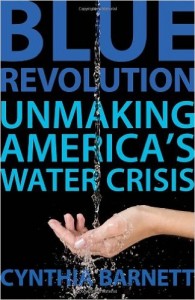When I read this Phillip Reese story Monday evening about a California community willfully defying the state’s water conservation orders, the name of the place rang a bell. I shot off an email to my friend Cynthia Barnett, author of the wonderful Blue Revolution, a call for a new water ethic in the United States. “Wasn’t Granite Bay the place you wrote about in Blue Revolution?” (My copy of the book was on the shelf at my University of New Mexico office – I push it on water resources students every chance I get.)
Turns out my memory was correct. It was the waterfalls I remembered, right there on the first page of the book:
The amenity to envy was no longer the diving board. The must-have, now, was the waterfall.
No community glorified the trend like Granite Bay, California….
In Granite Bay’s best backyards, rocky waterfalls cascade artfully into boulder-lined swimming pools, set off with grottoes, swim-up bars, and built-in hot tubs. Thick bushes and trees bearing flowers and fruit adorn the watery wonders, making a place naturally dominated by needlegrass and sedge look more like Fiji. Precisely groomed lawns, a quarter acre and larger, complete the sublimely unnatural tableau.
As Barnett noted, that comes with a cost – water use more than three times the national average.
As Reese noted, Granite Bay still uses a lot of water:
In July, San Juan Water District customers used more than 400 gallons of water per capita, more than 100 gallons per capita more than any other district in the region, state figures show.
To be fair, Granite Bay residents have cut back just like everyone else, but they’re still among the state’s big residential water users, and the message sent by their unwillingness to keep up the pressure is telling. It made Cynthia sad (email comment shared with permission):
Granite Bay struck me as perhaps the best example in the nation of the illusion of water abundance and our lack of an ethic for water in America. Today, it is perhaps the best example of a lost opportunity to show that even the most water-addicted communities can change, and live ethically with water — while still living really well.

